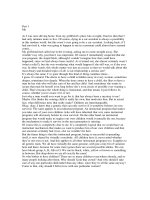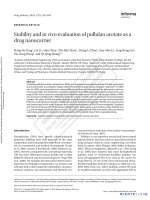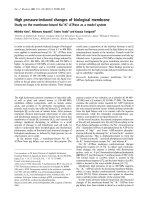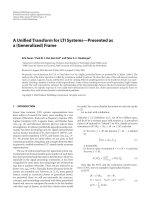240246763 david bohm thought as a system
Bạn đang xem bản rút gọn của tài liệu. Xem và tải ngay bản đầy đủ của tài liệu tại đây (1.13 MB, 271 trang )
THOUGHT AS A SYSTEM
In Thought as a System, best-selling author David Bohm takes
as his subject the role of thought and knowledge at every
level of human affairs, from our private reflections on
personal identity to our collective efforts to fashion a
tolerable civilization.
Elaborating upon principles of the relationship between
mind and matter first put forward in Wholeness and the
Implicate Order, Professor Bohm rejects the notion that our
thinking processes neutrally report on what is ‘out there’ in
an objective world. He explores the manner in which
thought actively participates in forming our perceptions,
our sense of meaning and our daily actions. He suggests
that collective thought and knowledge have become so
automated that we are in large part controlled by them,
with a subsequent loss of authenticity, freedom and order.
In conversations with fifty seminar participants in Ojai,
California, David Bohm offers a radical perspective on an
underlying source of human conflict, and inquires into the
possibility of individual and collective transformation.
The late David Bohm was Emeritus Professor at Birkbeck
College, University of London. He was the author of many
articles and books including Causality and Chance in Modern
Physics, Wholeness and the Implicate Order and The Undivided
Universe (with Basil Hiley).
This page intentionally left blank.
THOUGHT AS A
SYSTEM
David Bohm
This is a transcription of a seminar held in Ojai, California
from 31 November to 2 December 1990. It has been edited by
Professor Bohm.
London and New York
First published 1992
by David Bohm Seminars
This edition first published 1994
by Routledge
11 New Fetter Lane, London EC4P 4EE
Simultaneously published in the USA and Canada
by Routledge
29 West 35th Street, New York, NY 10001
© 1994 Sarah Bohm
Routledge is an imprint of the Taylor & Francis Group
This edition published in the Taylor & Francis e-Library, 2004.
All rights reserved. No part of this book may be reprinted or
reproduced or utilised in any form or by any electronic,
mechanical, or other means, now known or hereafter
invented, including photocopying and recording, or in any
information storage or retrieval system, without permission in
writing from the publishers.
British Library Cataloguing in Publication Data
A catalogue record for this book is available from the British
Library
Library of Congress Cataloguing in Publication Data
Bohm, David.
Thought as a system/David Bohm
p. cm.
Includes index.
1. Philosophy of mind. 2. Knowledge, Theory of. I. Title
BD418.3.R64 1994
128′.2–dc20 93–46728
ISBN 0-203-20224-4 Master e-book ISBN
ISBN 0-203-26616-1 (Adobe eReader Format)
ISBN 0-415-11980-4 (hbk)
ISBN 0-415-11030-0 (pbk)
David Bohm died in 1992.
This book is dedicated to his memory.
This page intentionally left blank.
CONTENTS
Foreword
Acknowledgements
Friday evening
ix
xvii
1
Saturday morning
43
Saturday afternoon
89
Sunday morning
147
Sunday afternoon
189
Index
244
This page intentionally left blank.
FOREWORD
In Thought as a System theoretical physicist David Bohm
takes as his subject the role of thought and knowledge at
every level of human affairs, from our private reflections on
personal identity to our collective efforts to fashion a
tolerable civilization. Elaborating upon principles of the
relationship between mind and matter first put forward in
Wholeness and the Implicate Order, Dr Bohm rejects the notion
that our thinking processes neutrally report on what is ‘out
there’ in an objective world. He explores the manner in
which thought actively participates in forming our
perceptions, our sense of meaning and our daily actions. He
suggests that collective thought and knowledge have
become so automated that we are in large part controlled by
them, with a subsequent loss of authenticity, freedom and
order. In three days of conversation with fifty seminar
participants in Ojai, California, Dr Bohm offers a radical
perspective on an underlying source of human conflict, and
inquires into the possibility of individual and collective
transformation.
In Bohm’s view, we have inherited a belief that mind (or
thought) is of an inherently different and higher order than
matter. This belief has nurtured a faith in what we call objectivity
—the capacity to observe and report neutrally on some
object or event, without having any effect on what we are
looking at, or without being affected by it. Historically, this
perspective has given us a scientific and cultural world
view in which isolated, fragmentary parts mechanically
interact with one another. Bohm points out that this
x THOUGHT AS A SYSTEM
fragmentary view corresponds to ‘reality’ in significant
respects, but suggests that we have overextended our faith
in the objectivist perspective. Once we make the critical
(and false) assumption that thought and knowledge are not
participating in our sense of reality, but only reporting on
it, we are committed to a view that does not take into
account the complex, unbroken processes that underlie the
world as we experience it.
To help bring into focus thought’s participatory nature,
Bohm undertakes an extensive redefinition of thought itself.
To begin with, thought is not fresh, direct perception. It is
literally that which has been ‘thought’—the past, carried
forward into the present. It is the instantaneous display of
memory, a superimposition of images onto the active, living
present. On the one hand, this memory is what allows us to
perform even the simplest of tasks, such as getting dressed
in the morning. On the other hand, memory is also
responsible for various aspects of fear, anxiety or
apprehension, and the actions that proceed from these
memories. Thought, then, is also inclusive of feelings, in the
form of latent emotional experiences. Not only negative,
painful emotions are folded into thought, but pleasurable
ones as well. Indeed, the whole spectrum of emotions as we
typically experience them is seen by Bohm as thought-related.
The manner in which feeling and thought interpenetrate
one another is central to Bohm’s view of the functioning of
consciousness. Throughout the mind and body, he says,
they form a structure of neurophysiological reflexes.
Through repetition, emotional intensity and defensiveness,
these reflexes become ‘hard-wired’ in consciousness, to such
an extent that they respond independently of our conscious
choice. If, for example, someone tells you that a member of
your family is both ugly and stupid, you will most likely
have instantaneous surges of adrenalin and blood pressure
that are inseparable from your thought: ‘He is wrong! He is
rude and malicious for saying such things!’ The thought
‘He is wrong!’ will tend to justify and perpetuate the bodily
FOREWORD xi
surges. Likewise, the surges will tend to certify the thought.
In time, the experience will fade, but it is effectively stored
in the memory and becomes ‘thought’. There it waits to be
instantly recalled the next time a similar situation is
encountered.
In addition to emotions and reflexes, Bohm includes human
artifacts in his definition of thought. Computer systems,
musical instruments, cars, buildings—these are all
illustrations of thought in its fixed, concrete form. From
Bohm’s perspective, to make a fundamental separation
between thought and its products would be the equivalent
of suggesting that whether a person is male or female is a
separate phenomenon from the genetic process that
determined the sex to begin with. Such a separation would
in fact illustrate the very fragmentation under examination.
Finally, Bohm posits that thought and knowledge are
primarily collective phenomena. Our common experience is
that we have personal thoughts that come from our
individual ‘self’. Bohm suggests that this is a culturally
inherited sensibility that overemphasizes the role of isolated
parts. He inverts this view, noting that the ‘flow of
meaning’ between people is more fundamental than any
individual’s particular thoughts. The individual is thus seen
as an idiosyncrasy (literally, ‘private mixture’) of the
collective movement of values, meanings and intentions.
The essential relevance of Bohm’s redefinition of thought is
the proposal that body, emotion, intellect, reflex and artifact
are now understood as one unbroken field of mutually
informing thought. All of these components interpenetrate
one another to such an extent, says Bohm, that we are
compelled to see ‘thought as a system’—concrete as well as
abstract, active as well as passive, collective as well as individual.
Our traditional world view, in an attempt to maintain a
simple, orderly image of cause and effect, does not take into
account these subtler aspects of thought’s activity. This
leads to what Bohm calls a ‘systemic fault’ in the whole of
thought. The issue here, says Bohm, is that ‘thought doesn’t
xii THOUGHT AS A SYSTEM
know it is doing something and then struggles against what
it is doing’. For example, flattery is a pleasing experience
which usually sets up a reflex of receptivity toward the one
who flatters. If Jane fails to flatter John when he expects her
to, or takes advantage of him in some unpleasant way, John
will attribute his subsequent bad feelings to something Jane
did. He fails to see that he participated in constructing the
reflex that produced not only the good feelings, but the bad
ones as well. A similar process of incoherence is at work in
the nation-state. When the United States attributes
diabolical characteristics to various Middle East countries
that thwart its easy access to oil, it is not taking into account
its own central involvement in an international petroleumbased economy which quite naturally gives inordinate
power to those who possess crude oil. In this case, the
reflexive response may be war. The feature common to both
examples is the sense of being in control with an
independent response: ‘I will get even with her’ or ‘we
must demonstrate where the real power lies’. In Bohm’s
view, the real power is in the activity of thought. While
independence and choice appear to be inherent in our
actions, we are actually being driven by agendas which act
faster than, and independent of, our conscious choice. Bohm
sees the pervasive tendency of thought to struggle against
its own creations as the central dilemma of our time.
Consequently, we must now endeavour not only to apply
thought, but to understand what thought is, to grasp the
significance of its immediate activity, both in and around us.
Is it possible, then, to be aware of the activity of thought
without acquiring a new agenda, namely, the intention to
‘fix’ thought? Can we suspend our habit of defining and
solving problems, and attend to thought as if for the first
time? Such open learning, says Bohm, lays the foundation
for an exploration of proprioception. Proprioception (literally,
‘selfperception’) is that which enables us to walk, sit, eat, or
engage in any other daily activity without having
constantly to monitor what we are doing. An instantaneous
FOREWORD xiii
feedback system informs the body, allowing it to act
without conscious control. If we wish to scratch a mosquito
bite on the back of our leg, it is proprioception that allows
us to scratch the bite without (a) looking at our hand, (b)
looking at our leg or (c) having the mistaken impression
that someone else is scratching our leg.
Dr Bohm points out that while proprioception of the body
comes naturally, we do not seem to have proprioception of
thought. If, however, mind and matter are indeed a
continuum, it is reasonable to explore the extension of
physiological proprioception into the more subtle material
activity of thought. Bohm suggests that the immediacy and
accuracy of bodily proprioception are inhibited at the level
of thought due to the gross accumulation of reflexes,
personified in the image of a ‘thinker’—an interior entity
who seems to look out on the world, as well as looking
inwardly at emotions, thoughts and so on. This thinker,
says Bohm, is a product of thought, rather than a
transcendental entity; and the thinker is steadfastly
committed to preserving some variation of its own reflexive
structure. Here the state of open learning is crucial for new
understanding. If the reflexive structure can be simply
attended to, rather than acted upon (as the thinker would be
inclined to do), then the momentum which drives the
reflexes is already being dissipated. In this vein, Bohm
outlines a series of practical experiments which call into
awareness the interplay of words and feelings in the
formation of reflexes. This conjunction of open learning and
concrete experiments with the thought-feeling dynamic
suggests the beginning of proprioception of thought.
Such proprioception is intimately related to that which Dr
Bohm refers to as ‘insight’. We often associate insight with
the ‘a-ha!’ phenomenon of having suddenly grasped the
significance of some puzzle or problem. Bohm’s notion of
insight includes such particular instances, but extends to a
much more general, and generative, level of application. He
sees insight as an active energy, a subtle level of intelligence
xiv THOUGHT AS A SYSTEM
in the universe at large, of a different order from that which
we commonly experience in the mind/matter domain. He
suggests that such insight has the capacity to directly affect
the structure of the brain, dispelling the ‘electrochemical
fog’ generated by accumulated reflexes. Quite unlike the
memoryladen structure of a ‘thinker’ operating upon
thought, proprioception provides a medium of appropriate
subtlety for the activity of such insight. In this way,
learning, proprioception and insight work together, with
the potential to reorder our thought processes and bring
about a general level of coherence unavailable through
thought alone.
While all these experiments can be undertaken by
individuals, Bohm points to a complementary mode of
inquiry through the process of group dialogue. He suggests
that such meetings have no advance agenda, other than the
intention to explore thought. And though a facilitator may
be useful in the beginning, the meetings should be free of
authority so that people speak directly to one another. In
groups of twenty to forty people, the systemic and reflexive
nature of thought can come clearly into focus, eliciting a
wide range of responses from the participants. Self-images,
assumptions and prejudices may all emerge, often with
their attendant emotions—defensiveness, anger, fear and
many others. The virtue of such an approach, says Bohm, is
that the group may be able to detect the flow of meaning
passing amongst its members. This meaning may be the
content of some particular subject; it may also be the
quickened pulses that pass through the group as the result
of conflict between two or more members. Such dialogue
holds out the possibility of direct insight into the collective
movement of thought, rather than its expression in any
particular individual. Bohm suggests that the potential for
collective intelligence inherent in such groups could lead to
a new and creative art form, one which may involve
significant numbers of people and beneficially affect the
trajectory of our current civilization.
FOREWORD xv
Throughout Thought as a System Dr Bohm emphasizes that
the model of thought he puts forward is propositional. Not
only does he deny any final knowledge of these issues for
himself; he claims that no such knowledge is even possible.
Such knowledge would be thought, which can only make
approximate representations. Dr Bohm often invoked
Alfred Korzybski’s observation that any object of thought
(including, for Bohm, thought itself) is both ‘more than
what we think, and different’. None the less, as we do rely
to a great extent on images and representations, a relatively
accurate map of the processes of thought, based on clear
observation and sound inferences, is surely more desirable
than a flawed map. It was Dr Bohm’s intention that Thought
as a System be approached as just such a propositional map,
to be tested against direct life experiences, and measured by
its veracity and its usefulness in reducing conflict and
sorrow in the world at large.
Lee Nichol
Ojai, California
September, 1993
This page intentionally left blank.
ACKNOWLEDGEMENTS
Since 1986 David Bohm went to Ojai, California, each year to
give what came to be known as the David Bohm Seminars.
These seminars were arranged by a small group of people
without whom this book could not have been written, for it
is an account of the 1990 seminar. David valued their help
and friendship very much and I want to thank them on his
behalf. They are Michael Frederick, Booth Harris, David
Moody, Lee Nichol and Joe Zorskie. Also, a special thanks to
Phildea Fleming and James Brodsky who transcribed, edited
and printed these transcripts making them available to all
who took part in the seminars. They were in constant
telephone contact with David, going into all aspects of the
editing of the audio-tapes and making it possible for him
then to do the final editing.
None of this would have happened without all the
participants to the seminars who became our friends over
the years and the many other people involved. My thanks
to them too. I would also like to thank the Directors and
Board of the Oak Grove School in Ojai. The library there
made the ideal setting for the seminars.
Lastly, I want to thank David Stonestreet of Routledge for
his constant active interest in David Bohm’s work and his
unfailing help to me.
Sarah Bohm
This page intentionally left blank.
FRIDAY EVENING
David Bohm: We have more people at this seminar than
we’ve had before, a number of whom are here for the first
time. I’ll try not to be too repetitious, but we must go over
some of the old ground. And we hope there will be some
new material.
These meetings have been concerned with the question of
thought and what it has been doing in the world.
By way of review, we all know that the world is in a
difficult situation and has been basically for a long time;
that we now have many crises in various parts of the world.
We have the fact that there is nationalism all over. People
seem to have all sorts of hatreds, such as religious hatred or
racial hatred, and so on. There is the ecological crisis, which
goes on and off the back burner, and there is the continuing
economic crisis developing. People seem unable to get
together to face the common problems, such as the
ecological one or the economic one. Everything is
interdependent; and yet the more interdependent we get,
the more we seem to split up into little groups that don’t
like each other and are inclined to fight each other and kill
each other, or at least not to cooperate.
So one begins to wonder what is going to happen to the
human race. Technology keeps on advancing with greater
and greater power, either for good or for destruction. And
it seems that there is always this danger of destruction. No
sooner does the rivalry between the West and the East sort
of dissolve away than other conflicts pop up elsewhere.
1
2 THOUGHT AS A SYSTEM
And doubtless others will come up later, and on it goes. It’s
sort of endemic; it’s not just something that occasionally
happens. It’s in the whole situation.
I think we are all familiar with this situation. And with
technology advancing you have the possibility that nuclear
bombs will perhaps soon be available to all sorts of
dictators, even in relatively small nations. There are
biological weapons and chemical weapons, and other kinds
of weapons that haven’t yet been invented but surely will.
And then there is the economy to consider. Either we go
into a depression, which will help save the ecology, or we
go into a boom, which will momentarily make us happy but
will eventually ruin the ecology. I mean, the faster we go
into prosperity, the faster we create all of these other problems.
It seems that whichever way you turn, it doesn’t really
work. Why not? Is there any way out? Can you imagine
that a hundred or two hundred or five hundred years of
this won’t lead to some gigantic catastrophe, either to the
ecology or in some other way? Perhaps more wars, who
knows?
People have been dealing with this piecemeal—looking at
symptoms, saying that we’ve got to solve this problem or
that problem or that problem. But there is something
deeper, which people haven’t been considering, that is
constantly generating these problems. We can use the
analogy of a stream, where people are pouring pollution
upstream at the same time they are trying to remove it
downstream. But as they remove it they may be adding
more pollution of a different kind.
What is the source of all this trouble? That is really what
we have been concerned with in all these dialogues of the
past few years. I’m saying that the source is basically in
thought. Many people would think that such a statement is
crazy, because thought is the one thing we have with which
to solve our problems. That’s part of our tradition. Yet it
looks as if the thing we use to solve our problems is the
source of our problems. It’s like going to the doctor and
FRIDAY EVENING 3
having him make you ill. In fact, in 20 per cent of medical
cases we do apparently have that going on. But in the case
of thought, it’s far over 20 per cent.
I’m saying the reason we don’t see the source of our
problems is that the means by which we try to solve them
are the source. That may seem strange to somebody who
hears it for the first time, because our whole culture prides
itself on thought as its highest achievement. I’m not
suggesting that the achievements of thought are negligible;
there are very great achievements in technology, in culture
and in various other ways. But there is another side to it
which is leading to our destruction, and we have to look at that.
Now I’ll try to say what is wrong with thought. I’ll just
give a brief summary and then we might start talking about
it, if you like.
One of the obvious things wrong with thought is
fragmentation. Thought is breaking things up into bits which
should not be broken up. We can see this going on. We see
that the world is broken up into nations—more and more
nations. Russia no sooner got rid of the communist
dictatorship than it began breaking up into a lot of little bits
which obviously are unable to manage, and they started
fighting each other. That’s a source of concern. It’s a
concern for the whole world. There are new nations all over
the world. During the second World War, nationalism
developed in Latvia, Lithuania and Estonia. They said
‘Lithuania for the Lithuanians, Latvia for the Latvians,
Armenia for the Armenians’, and so on.
Nationalism has broken things up, and yet the world is
all one. The more technology develops, the more people
depend on each other. But people try to pretend that it’s not
so. They say that the nation is sovereign, that it can do what
it likes. And yet it can’t. The United States can’t do what it
likes because it depends a lot on other countries for things
of all sorts—on the Middle East for oil, apparently on Japan
for money. And Japan obviously can’t do what it likes.
Those are just some examples.
4 THOUGHT AS A SYSTEM
It seems very hard for human beings to accept seriously
this simple fact of the effect of fragmentation. Nations fight
each other and people kill each other. You are told that for
the nation you must sacrifice everything. Or you sacrifice
everything for your religious differences. People split into
religious groups. They split into racial groups and say that’s
all important. Inside each nation there are various splits.
People are divided up into sections and into all kinds of
interests. The division goes on down to the level of the
family, inside families and so forth. People are supposed to
be getting together, but they can’t seem to.
You can see that nations are established by thought. The
boundary of the nation is invented by thought. If you go to
the edge of the nation, there’s nothing to tell you that it is a
boundary, unless somebody makes a wall or something. It’s
the same land; the people may often be not very different.
But what is one side or the other seems all important. It’s
thought that ‘makes it so’.
I was informed that most of the nations of the Middle
East were invented either by the British or the French,
whose various bureaucrats drew lines and determined the
boundary of this nation, that nation, that nation. And there
they were. So then they have to fight each other.
In other words, what we are doing is establishing
boundaries where really there is a close connection—that’s
what is wrong with fragmentation. And at the same time
we are trying to establish unity where there isn’t any, or not
very much. We say we’re all one inside the boundary. But
when you look at these groups, they are not actually all
one. They are fighting each other inside the boundary as
much as they are fighting outside.
We can also consider professional groups. In science, for
instance, every little speciality is fragmented from every
other one. People hardly know what is happening in a
somewhat different field. And it goes on. Knowledge is
fragmented. Everything gets broken up.
FRIDAY EVENING 5
Thus we have false division and false unification.
Thought is pretending that there is a sharp division outside
and that everything is unified inside, when it’s really not so.
This is a fictional way of thinking. But to go on with this
fictional way of thinking seems to be very important, so
important that the actual fact that it is wrong, the fact that
it’s not that way at all, is ignored.
It seems strange. Why should people do such a strange
thing? It really could be thought of as irrational at the very
least, or perhaps crazy. So much trouble, which may even
prevent our survival, is created out of such small things.
The more general difficulty with thought is that thought
is very active, it’s participatory. And fragmentation is itself a
symptom of the more general difficulty. Thought is always
doing a great deal, but it tends to say that it hasn’t done
anything, that it is just telling you the way things are. But
thought affects everything. It has created everything we see
in this building. It has affected all the trees, it has affected
the mountains, the plains and the farms and the factories
and science and technology. Even the South Pole has been
affected because of the destruction of the ozone layer,
which is basically due to thought. People thought that they
wanted to have refrigerant—a nice safe refrigerant—and
they built that all up by thinking more and more about it.
And now we have the ozone layer being destroyed.
Thought has produced tremendous effects outwardly.
And, as we’ll discuss further on, it produces tremendous
effects inwardly in each person. Yet the general tacit
assumption in thought is that it’s just telling you the way
things are and that is not doing anything—that ‘you’ are
inside there, deciding what to do with the information. But
I want to say that you don’t decide what to do with the
information. The information takes over. It runs you.
Thought runs you. Thought, however, gives the false
information that you are running it, that you are the one
who controls thought, whereas actually thought is the one
which controls each one of us. Until thought is understood—
6 THOUGHT AS A SYSTEM
better yet, more than understood, perceived—it will actually
control us; but it will create the impression that it is our
servant, that it is just doing what we want it to do.
That’s the difficulty. Thought is participating and then
saying it’s not participating. But it is taking part in
everything.
Fragmentation is a particular case of that. Thought is
creating divisions out of itself and then saying that they are
there naturally. The divisions between nations are regarded
as being ‘just there’, but obviously they were invented by
people. People have come to accept those divisions and that
made them be there. The same holds for the divisions
between religions. Every religion was invented by
somebody’s thinking that he had a certain idea about God
that was right and true. Eventually people thought that
other religions weren’t right, that other religions were
inferior, perhaps even heretical or evil or wrong, that they
could fight them, try to suppress them and destroy them.
There were vast religious wars. And we may still have
more coming, in spite of all the development of the
enlightenment, knowledge and science and technology. In
fact, science and technology now seem, at least equally well,
to serve those who are perhaps at a more Mediaeval stage
as it serves those who regard themselves as more advanced.
Anybody can use science and technology without
fundamentally altering his own frame of mind which
governs how they are used.
I’m saying thought has the character that it is doing
something and saying it isn’t doing it. Now, we really have
to go into that, to discuss it a great deal, because what
thought is actually doing is very much more subtle than
what I’ve described—that’s only the beginning.
Another problem of fragmentation is that thought divides
itself from feeling and from the body. Thought is said to be
the mind; we have the notion that it is something abstract
or spiritual or immaterial. Then there is the body, which is
very physical. And we have emotions, which are perhaps









